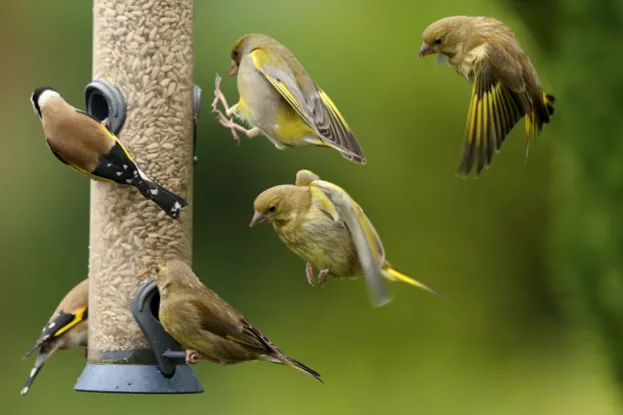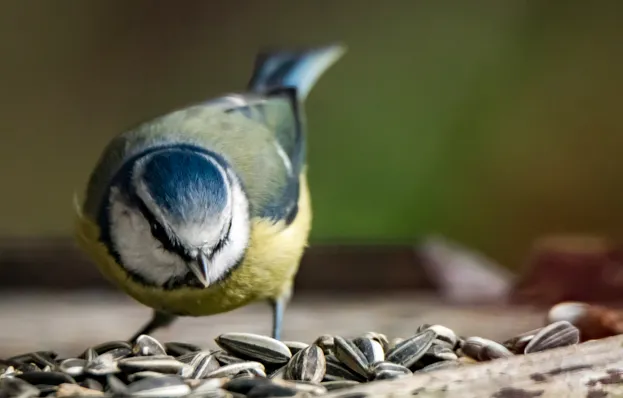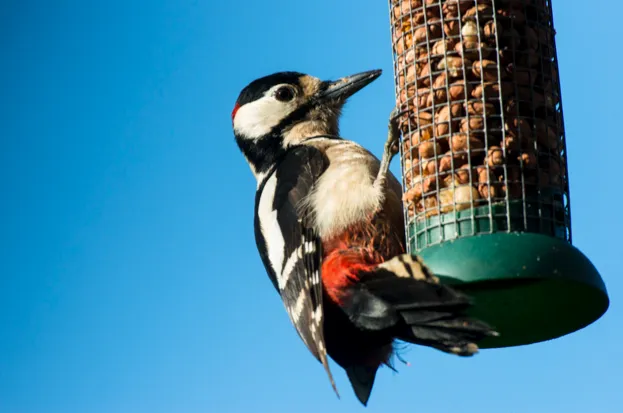Feeding birds in your garden is undeniably a good thing to do. You get pleasure from watching them and become more aware of how different species are faring in your local area, plus the birds get reliable sources of food. It’s win, win, win.
Except – have you ever considered where and how the bird food you buy is grown? In the UK and much of Europe, the biggest factor impacting many bird species is the way in which we farm, and sunflower seeds, peanuts and millet all have to be farmed. What if every time you refill the feeder outside your kitchen, you are stealing food from one ‘little dicky bird’ to give to another? You’re robbing Peter to pay Paul?

Goldfinches and greenfinches on a bird feeder © Andrew Howe / Getty
Last year’s State of Nature report – published by a coalition of more than 40 conservation groups and backed by Sir David Attenborough – found the intensive management of agricultural land has been responsible for 20 per cent of the declines seen in wildlife in the UK and has had the largest negative impact of any factor.
Key drivers of decline, said the RSPB’s Mark Eaton at the time, had been the loss of hedgerows and the increased use of pesticides and herbicides.
Fair to birds
In order to eliminate impacts on wild birds, the RSPB now insists the bird food it sells is produced to environmental standards drawn up by a company called Fair to Nature, which requires farmers to give over 10 per cent of their farm to growing food for wildlife.
At least four per cent must be planted up with pollinator habitat and at least two per cent with seed-bearing crops that produce food through the winter and into the so-called ‘hungry gap’ of February and March.
Other requirements involve hedgerow management to maximise berry yields in autumn, and provision of ponds. “The RSPB and BTO have very good evidence that you need to provide wild bird seed food crops on two per cent of a farm in order to reverse declines in farmland birds,” says Brin Hughes, technical manager for Fair to Nature.
A study carried out by scientists at Reading University published in 2015 found that butterfly and plant diversity was up to 20 per cent higher on farms working under Fair to Nature protocols than on conventional ones. There was also a positive boost for birds in winter and solitary bees, but no impact for birds in summer or bumblebees. Organic farming had significantly higher benefits for wildlife – but lower yields.
Fair to Nature farmers receive a premium for their crops from accredited brands to take account of the cost of creating habitats and producing food to a higher environmental standard. There are other benefits for them, too, Hughes argues.
“Rather than being pilloried in the community, our farmers are praised because the public can see wildflowers growing by the sides of footpaths,” he says. “It’s not uncommon, too, to see rugby-playing farmers waxing lyrical about flowers and telling children their Latin names.”
There are arguably two problems with Fair to Nature, however. The first is that it is considerably less well-recognised than other environmental certification schemes such as the Soil Association or the Forest Stewardship Council (FSC). At present, it is only adopted by 12 brands, of which the best known are the RSPB and the flour producer Allinson. Only three to five tonnes of Fair to Nature products reach consumers every year, and many are only available in niche stores.
“We are at a fledgling stage,” Hughes says. “People do ask me where the brands are, and I would like to see more.”
The other issue is that the bird food producers it works with (the RSPB and GardenBird’s Ultiva range) are generally more costly than other retailers. The RSPB charges (at the time of writing) £27.19 for a 12.75kg bag of sunflower seeds – and that’s discounted from £33 – making it £2.13/kg. GardenBird’s 12.55 bag sells for £23.99 or £1.91/kg.

Blue tit feeding on sunflower seeds © Joe Houghton / Getty
Other suppliers charge less: The Really Wild Birdfood Co £1.59/kg and Vine House Farm £1.88/kg for a 13kg bag. If you want to go bargain basement, you can get sunflower seeds for as little as £1.05 online.
My birds can peck their way through up to 2.5kg of sunflower hearts a week – at £2.13/kg, I could be spending nearly £280 a year on these alone, and I’m not sure I can afford that!
Boost for barn owls
Nicholas Watts, who produces canary seed, red and white millet and – though not in 2017 – sunflower seeds on his 8km2 holding for his Vine House Farm brand says he grows crops with wildlife and the environment in mind, though he doesn’t have Fair to Nature to demonstrate it. He does farm under Environmental Stewardship, whereby he gets payments under the Common Agricultural Policy for putting in, and managing, features such as hedgerows, rough field margins and winter cover crops.
“It’s had a positive impact for tree sparrows, whitethroats and barn owls,” he says.
Growing sunflowers in the UK is a “bit of a gamble”, he adds, and in poor summers, he hasn’t always managed to produce a crop. In any case, he can never grow enough to satisfy customer demand, so a lot of his sunflower seeds are imported from France. Watts says he doesn’t know the conditions under which the sunflowers he buys are grown and what impact they are having on wildlife in the area.
“You can’t kill all the weeds in sunflowers,” he says. “If you have a variety of weeds in the crops, then you have a variety of insects.” Which will be good for birds trying to feed chicks.
Some bird foods can’t be grown in Europe, the most obvious one being peanuts, which require a much warmer climate. China, India and North America are big peanut producers, but smallholders in West Africa also grow them in the sub-Saharan region known as the Sahel.

Peanuts can't be grown in the UK © Duncan Shaw / Getty
Migrant crisis
This region is a vital overwintering and refuelling location for many of Britain’s migratory birds, including turtle doves, wheatears, pied and spotted flycatchers, nightingales, willow warblers and redstarts. Most of these are in decline, with turtle doves in virtual free-fall – the European breeding population has crashed by 78 per cent since 1980, while in the UK numbers have plummeted by a staggering 91 per cent.
Why so many of our summer visitors are under pressure is unclear, but the very nature of their migratory lifestyle is key. It means they are impacted by changes to their habitat here in the UK and by what happens on migration and in their overwintering sites.
New farming practices and a changing, drier climate in West Africa could be a factor for certain species. That’s why Fair to Nature and the RSPB are working to develop a certification standard for Sahel-grown peanuts so consumers can be assured the ones they buy are not contributing to our migrant birds’ declines.
Of course, farming in West Africa is very different to farming in Europe, so the standard has to take different needs into account, though the premise of giving 10 per cent of land to wildlife is the same. Wildlife areas will be ponds, flower and fruit-bearing shrubs and leaving some seed-producing crops unharvested. But Brin Hughes admits the search is still on to find the first farmers to be given the Fair to Nature stamp of approval.
Perhaps, you’re thinking, the impact of growing bird seed on the environment is negligible compared with that of other crops such as wheat or maize, and you’d be right.
But consider this: according to the Pet Food Manufacturers Association, British retailers sold 120,000 tonnes of seeds and seed mixes in 2016. True, not all of that will have been sunflower seeds, but if you assume a yield rate of two tonnes/0.01km2, that could still account for 600km2 – equivalent to 40 per cent of the RSPB’s entire landholding across the UK – of farmland across the main sunflower-growing European countries of Bulgaria, Romania, France and Spain where people who love birds could help them to thrive by what they choose to buy.
That’s one heck of a nature reserve.

